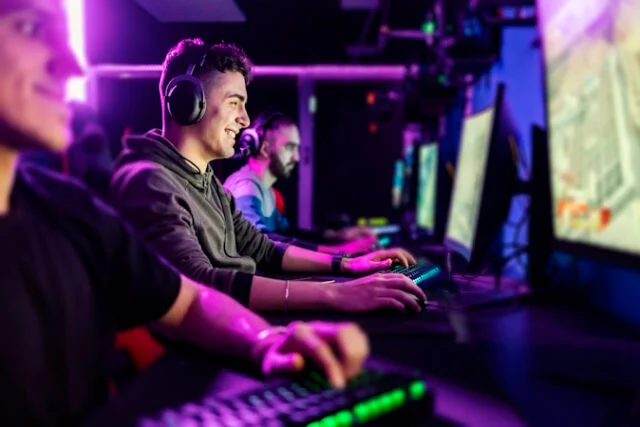Introduction: It’s Not Just a Game Anymore
Gaming in 2025 isn’t just entertainment—it’s a culture, a career, a connection, and a canvas for creativity. With the explosion of AI, immersive VR worlds, cloud-based platforms, and social-first design, the line between reality and virtual experience continues to blur.
Whether you’re a casual mobile gamer or a competitive esports pro, the landscape has changed dramatically—and it’s only getting more exciting.
Cloud Gaming Is Taking Over: Play Anywhere, Anytime
Remember when gaming required expensive consoles or high-end PCs? In 2025, cloud gaming has redefined access. Platforms like Xbox Cloud Gaming, NVIDIA GeForce Now, and Amazon Luna let players stream AAA titles instantly across devices.
Why it matters:
- No need for downloads or hardware upgrades
- Seamless cross-device play—start on your laptop, continue on your phone
- Gaming is becoming more accessible to low-income and mobile-first users worldwide
Cloud gaming is making quality experiences universal and frictionless—the way Netflix changed how we watch TV.
AI NPCs: Characters With Real Personality
Thanks to generative AI, non-playable characters (NPCs) are no longer robotic quest-givers—they’re evolving into adaptive, emotionally intelligent companions that can remember your past interactions and respond in complex ways.
Notable advances:
- AI-powered dialogue trees that feel dynamic and human
- Open-world games like Starfield and The Sims integrating procedural behavior patterns
- Indie developers using AI to create deeply reactive, emergent storylines
In 2025, you’re not just playing a game—you’re building relationships inside it.
Esports and Competitive Gaming: Now a Global Spectacle
What started as niche tournaments is now a billion-dollar industry. In 2025, esports rival traditional sports in viewership and cultural impact.
Current trends:
- Valorant, League of Legends, and Counter-Strike 2 dominate global arenas
- University esports scholarships are more common than ever
- Social platforms like Twitch and Kick are producing gaming celebrities with massive followings
Competitive gaming has become a career path, a fandom, and a proving ground for the next generation of digital athletes.
VR and AR: Immersion Like Never Before
Virtual reality isn’t a gimmick anymore—it’s becoming a mainstream way to play. With lighter headsets, haptic feedback gloves, and motion-tracking advancements, VR has become an ultra-immersive portal to other worlds.
What’s hot in immersive gaming:
- Horizon Call of the Mountain and Half-Life: Alyx continue setting benchmarks
- Mixed reality setups that let you move through physical rooms while interacting with digital space
- Fitness-based games like Supernatural turning workouts into epic adventures
Exploration, combat, and creation have never felt so real—VR is the new frontier of escapism.
Mobile Games Are Getting Smarter—and Deeper
Forget the days of mindless tapping. In 2025, mobile games are visually stunning, story-rich, and socially driven.
Trends to watch:
- Gacha and narrative RPGs like Genshin Impact and Honkai: Star Rail continue to lead
- AI-assisted matchmaking and storytelling, creating personalized sessions
- Built-in social features—group chats, livestreams, co-op quests—make mobile gaming deeply connected
Your phone is now a pocket-sized console, theater, and social hub.
Gaming and Mental Health: More Than Just an Escape
Modern games are not only fun—they’re therapeutic. Studies and communities are increasingly recognizing gaming as a tool for stress relief, creativity, and connection.
Key developments:
- Meditative and cozy games like Stardew Valley, Spiritfarer, and Unpacking gain popularity
- Games addressing mental health themes—such as grief, anxiety, and healing—are thriving in the indie scene
- Online co-op games offer a sense of belonging for isolated individuals
Gaming has become a safe space, a coping tool, and a medium for empathy.
Conclusion: The Future of Gaming Is Personal, Powerful, and Limitless
Gaming in 2025 is no longer defined by one platform, one genre, or one type of player. It’s personalized, portable, and profoundly impactful. Whether you’re escaping into a virtual galaxy, forming friendships in an online guild, or competing on a world stage—you’re not just playing the game. You’re living it.
So plug in, level up, and get ready—because the best parts of gaming? They’re still loading.

